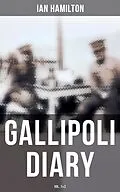Ian Hamilton's Gallipoli Diary (Vol. 1&2) offers readers a firsthand account of the Gallipoli Campaign during World War I, written in a detailed and engaging literary style. The book not only documents the military strategies and battles but also provides insight into the daily life of soldiers on both sides of the conflict. Hamilton's vivid descriptions and personal reflections immerse the reader in the harsh realities of war, making it a valuable historical resource. The diary format adds authenticity to the narrative, giving readers a sense of immediacy and intimacy with the events recounted. This two-volume set is a must-read for history enthusiasts and WWI scholars alike. Ian Hamilton, a British military commander who played a significant role in the Gallipoli Campaign, wrote Gallipoli Diary based on his own experiences and observations during the operation. His background in military strategy and leadership provides a unique perspective on the events unfolding in the diary, adding depth and credibility to the narrative. Hamilton's detailed accounts offer valuable insights into the complexities of war and the sacrifices made by soldiers on both sides of the conflict. I highly recommend Ian Hamilton's Gallipoli Diary (Vol. 1&2) to anyone interested in gaining a deeper understanding of the Gallipoli Campaign and the human experiences of war. Hamilton's compelling narrative and authentic voice make this book a captivating and informative read, shedding light on a pivotal moment in history.
Autorentext
Ian Hamilton (1853-1947) was a British Army officer who, following an extensive British Imperial military career in the Victorian and Edwardian eras, commanded the Mediterranean Expeditionary Force in the Gallipoli Campaign of the First World War. Along with his professional career Hamilton was a prolific writer. He published a volume of poetry and a novel. Examples of his written works include: The Fighting of the Future, Icarus, A Jaunt on a Junk, A Ballad of Hadji, and A Staff Officer's Scrapbook.
Zusammenfassung
This account of the Gallipoli Campaign was written from the perspective of a British Army officer. The Gallipoli Campaign was a military campaign in the First World War that took place on the Gallipoli peninsula February 1915 to January 1916. The Entente powers, Britain, France and Russia, sought to weaken the Ottoman Empire, one of the Central Powers, by taking control of the straits that provided a supply route to the Russian Empire. The Allies' attack on Ottoman forts at the entrance of the Dardanelles in February 1915 failed and was followed by an amphibious landing on the Gallipoli peninsula in April 1915 to capture the Ottoman capital of Constantinople. In January 1916, after eight months' fighting, with approximately 250,000 casualties on each side, the land campaign was abandoned and the invasion force withdrawn. It was a costly defeat for the Entente powers and for the sponsors, especially First Lord of the Admiralty (1911-1915), Winston Churchill. The campaign was considered a great Ottoman victory.Contents:The StartThe StraitsEgyptClearing for ActionThe LandingMaking GoodShellsTwo Corps or an Ally?SubmarinesA Decision and the PlanBombs and JournalistsA Victory and AfterK.'s Advice and the P.M.'s EnvoyThe Force Real and ImaginarySari Bair and SuvlaKavak Tepe Attack CollapsesThe Last BattleMisunderstandingsThe French PlanLoos and SalonikaThe Beginning of the End
